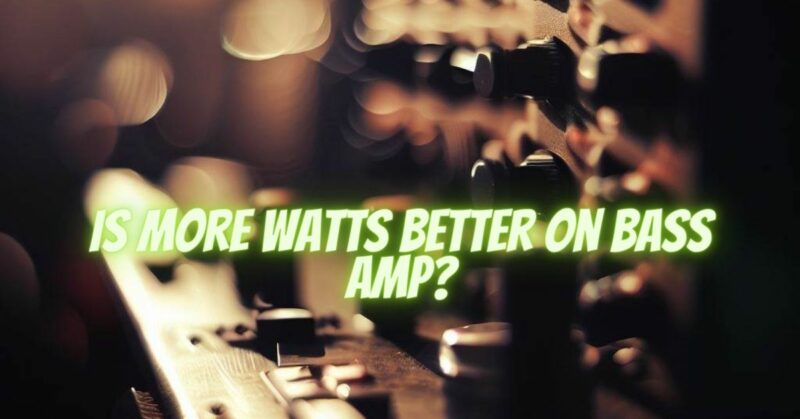When it comes to bass amplifiers, the topic of wattage often sparks debates among musicians. One common question that arises is whether more watts are better for a bass amp. While higher wattage can offer certain advantages, it is essential to understand the implications and consider various factors to determine the optimal wattage for your bass playing needs. In this article, we will explore the effects of wattage on bass amplifiers, helping you make an informed decision about the right amount of power for your musical endeavors.
- Volume and Headroom:
One of the primary benefits of higher wattage on a bass amp is increased volume and headroom. Higher wattage amps can produce louder sound levels, allowing you to project your bass lines with greater clarity and authority. The additional headroom provides the ability to handle dynamic peaks without distorting or compressing the sound. If you regularly play in larger venues or with a band that requires substantial volume, more watts can ensure that your bass cuts through the mix and provides the necessary impact.
- Low-End Response:
Another advantage of higher wattage amps is improved low-end response. Bass frequencies require more power to reproduce accurately, and a higher wattage amp can deliver the necessary power to maintain a tight and defined low end. With more watts, the amp’s power section can drive the speakers more effectively, resulting in enhanced bass depth and articulation. This can be especially beneficial for genres that emphasize low-end presence, such as rock, metal, or funk.
- Clean Headroom vs. Tube Saturation:
The wattage of a bass amp can also influence the clean headroom and the ability to achieve desirable tube saturation. Lower wattage amps tend to reach their maximum volume and tonal saturation at lower volume levels, making them suitable for those seeking natural tube distortion at lower volumes. On the other hand, higher wattage amps provide more clean headroom, allowing for cleaner tones even at higher volumes. If you prioritize clean and pristine bass tones, more watts can be advantageous.
- Venue Size and Playing Context:
Consider the venues where you typically perform and the musical contexts in which you play. If you mainly play in smaller venues or practice at home, a high-wattage amp may not be necessary, as the extra power might go unused. However, if you frequently gig in larger venues or with bands that demand high volume levels, more watts can provide the necessary projection and ensure your bass is heard clearly in the mix. It’s essential to strike a balance between the amp’s wattage and the specific requirements of your playing context.
- Personal Preferences and Future Growth:
Your personal preferences and aspirations should also be taken into account. Some bassists prefer the feel and response of higher wattage amps, even if they don’t always require their full power. Investing in a higher wattage amp can provide you with flexibility and room to grow as your playing style and musical projects evolve. It allows you to handle various gigging situations and ensures that your gear can keep up with your musical aspirations.
Conclusion:
While higher wattage can offer advantages in terms of volume, headroom, low-end response, and clean tones, the optimal amount of power for a bass amp depends on several factors. Consider your playing context, venue size, musical genre, and personal preferences to determine the right wattage for your needs. It’s important to strike a balance between having enough power to meet your requirements and avoiding excess wattage that might go unused. By evaluating these factors, you can select a bass amp that provides the ideal combination of power and performance for your bass playing journey.


